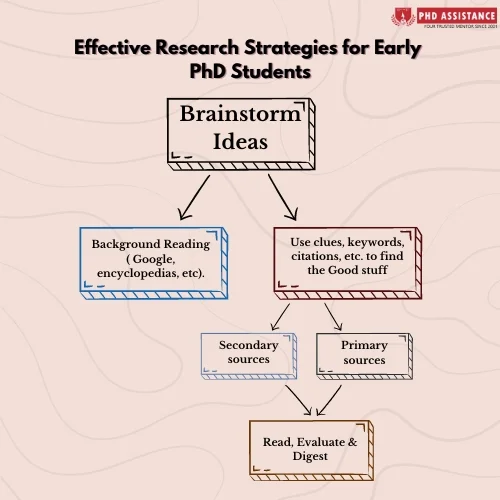Navigating the Maze: Effective Research Strategies for Early PhD Students
Introduction
Commencing a PhD journey can be likened to making a foray into the labyrinth of knowledge, where every twist and turn tends to present novel opportunities and challenges. For students who have just started their PhD journeys (early students), the journey on the whole can evoke a sense of overwhelming. However, armed with the appropriate strategies, it can be navigated effectively. Research forms the crux of all PhD research attempts, and sharpening your research skills right from the beginning would be vital for success. The purpose of this blog is to deep-dive into effective research strategies that are customized particularly for early Ph.D. students.
Effective Research Strategies

1. Outline your Research Goals
Prior to diving headlong into your research process, it would be imperative that you clearly outline your research goals (Singh, 2021). You need to know what you intend to realize through your research and what questions you seek answers to. Specific and well-focused research will help direct your efforts and keep you on track throughout your whole Ph.D. journey.
2. Establish a Robust Foundation
You need to develop a robust knowledge base in your research domain. The trick to doing this would be to conduct an extensive reading of relevant research papers. By reading through relevant research and scholarly papers, you will be able to acclimatize yourself to seminal works, recent developments, and key theories (Aukerman & Chambers Schuldt, 2021). Such foundational knowledge and understanding will present you with the required context for your research while enabling you to recognize gaps within the current literature that you could explore.
3. Develop your Research Questions
The soundness of your research will be based on the research questions you frame. Developing meaningful research questions is an art on its own. However, it is easier said than done. An integral aspect here would be to ensure that your questions are pertinent and specific and have the potential to produce novel insights. It would also help if you consulted with your supervisors and even peers to refine your research questions while ensuring that your questions are at par with your subject of research, and it would contribute to further knowledge within your domain.
4. Recognize the Power of Organizing
For PhD students, having organizational skills would be indispensable. As PhD students, you need to create a system that helps you to manage your notes, references, and research materials. It would also help if you used tools like software for managing references, such as EndNote, Mendeley, etc., for keeping track of your citations and effectively organizing your bibliography. It pays to develop good organizational skills early on (Agranovich et al., 2019), as it will be instrumental in helping you save time while restricting any unwarranted stress during your Ph.D. research endeavor.
5. Engaging with Literature
As a Ph.D. research scholar, you need to immerse yourself within prevalent literature pertaining to your research area. While extensive reading is required, what is more important is that all scholarly articles, books, and other literature be critically assessed (Hu, 2020). Make notes, highlight key aspects, and recognize gap areas that can be explored further. Engaging with relevant literature will not only help you enrich your understanding of the research domain but also be effective in positioning your research in the context of the wider academic discourse.
6. Seek Feedback
Having a soundboard at any point in your research always helps. Do not hold yourself back from seeking feedback from your supervisor, fellow mates, or peers within your domain. Share your research ideas, drafts, and findings with them, and be receptive to constructive criticism. Integrating feedback thus received during the early stages of your research process will reinforce your work and enable you to steer clear of potential pitfalls as you progress with your research (Duncanson et al., 2020).
7. Develop Research Skills
Spend time developing and honing necessary research skills like data collection, analysis, and interpretation. Get detailed knowledge about research techniques and methods and try to find opportunities to apply them to your research. Attending workshops, seminars, and conferences to improve your skills while staying abreast of the latest developments within your domain will also be intrinsic to success in research (Mydin et al., 2021).
8. Time Management
The key to success within any Ph.D. program is effective time management. It would be ideal that early researchers create a realistic schedule, allocating appropriate time for every activity within research, such as writing, coursework, data collection, personal activities, etc. Split all research tasks into smaller, manageable tasks and create deadlines. More importantly, sticking to deadlines would be the key (Saghir Ahmad et al., 2019). Do not forget to prioritize your tasks on the basis of their urgency and importance, and also leave room to adapt your schedule if needed.
9. Perseverance and Resilience
Early Ph.D. researchers have to understand that their Ph.D. journey is not a 100-meter dash but is more like a marathon. Setbacks and challenges are part and parcel of it, and in such situations, it would help if researchers were inclined to persevere and be resilient. At the outset, you need to keep a positive mindset, celebrate your achievements, and learn from failures. It is important to keep in mind that setbacks are essentially opportunities for refinement and growth. Keep moving ahead, taking one step at a time, and be confident about your capability to circumvent any challenges towards realizing the goal of your research.
Conclusion
Early Ph.D. students stand to gain tremendously from knowing effective research strategies. Clearly outlining research goals, setting a robust knowledge foundation, developing meaningful research questions, inculcating organizational skills, engaging with literature, seeking feedback, developing research skills, and time management, with perseverance and resilience can help early Ph.D. students to maneuver the challenges of Ph.D. research with confidence and gain success in their academic endeavors.
However, if everything else fails, you can always fall back on a Ph.D. Assistance as your backup. Ph.D. Assistance is a reputable organization that offers early Ph.D. students the required support for maneuvering through the intricate research landscape. They can be your guide, holding your hand throughout the process and offering you valuable insights and meaningful inputs that will help you sail through your PhD journey. Experts at PhD Assistance are equipped to offer guidance on myriad topics from varied domains, making your PhD journey easy. Wait no longer; help is just one phone call away.
References
- Agranovich, Y., Amirova, A., Ageyeva, L., Lebedeva, L., Aldibekova, S., & Uaidullakyzy, E. (2019). The Formation of Self-Organizational Skills of Student’s Academic Activity on the Basis of ‘Time Management’ Technology. International Journal of Emerging Technologies in Learning (IJET), 14(22). https://doi.org/10.3991/ijet.v14i22.11755
- Aukerman, M., & Chambers Schuldt, L. (2021). What Matters Most? Toward a Robust and Socially Just Science of Reading. Reading Research Quarterly, 56(S1). https://doi.org/10.1002/rrq.406
- Duncanson, K., Schmidt, D., & Webster, E. (2020). Giving and receiving written feedback on research reports: a narrative review and guidance for supervisors and students. Health Education in Practice: Journal of Research for Professional Learning, 3(2). https://doi.org/10.33966/hepj.3.2.14767
- Hu, X. (2020). Engaging with the Literature. In Smoothing a Critical Transition. Springer Singapore. https://doi.org/10.1007/978-981-15-4035-6_4
- Mydin, F., Rahman, R. S. A. R. A., & Mohammad, W. M. R. W. (2021). Research Collaboration: Enhancing the Research Skills and Self-Confidence of Early Career Academics. Asian Journal of University Education, 17(3). https://doi.org/10.24191/ajue.v17i3.14508
- Saghir Ahmad, Ayesha Batool, & Abid Hussain Ch. (2019). Path Relationship of Time Management and Academic Achievement of Students in Distance Learning Institutions. Pakistan Journal of Distance & Online Learning, V(II). https://files.eric.ed.gov/fulltext/EJ1266710.pdf
- Singh, A. (2021). Significance of Research Process in Research Work. March. https://www.researchgate.net/publication/350467546_Significance_of_Research_Process_in_Research_Work
 Previous Post
Previous Post
